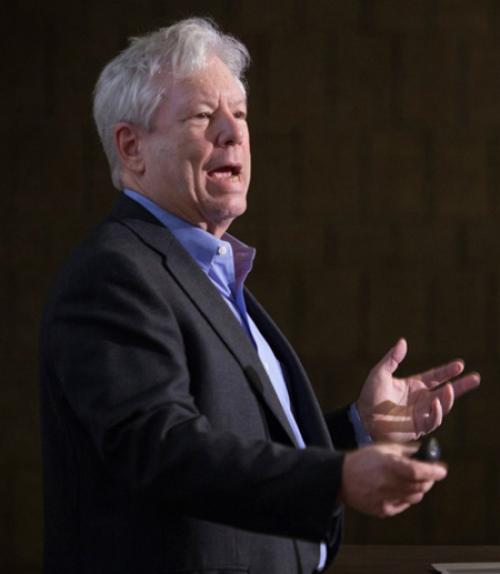Richard Thaler, professor of economics at Cornell for nearly two decades, was awarded the Nobel Memorial Prize in Economic Sciences Oct. 9 for work he began at Cornell.
Joining the Cornell faculty in 1978, Thaler was a young assistant professor who had decided to try to make a go of research on a new scholarly concept, behavioral economics, that married psychology and economics. He went looking for a job that would allow him to pursue it.
“Cornell stepped up to the plate and offered me a chance,” said Thaler, now the Charles R. Walgreen Distinguished Service Professor of Behavioral Science and Economics at the University of Chicago. “Given the lag between when work is done and when the Nobel Prize is awarded in economics, it would be accurate to say that the prize was largely given for work I did in my Cornell years.”
Early in his career at Cornell, Thaler wrote a seminal paper, “Toward a Positive Theory of Consumer Choice,” that created a blueprint for the field of behavioral economics. It was unlike any paper before it, said Robert H. Frank, Cornell’s Henrietta Johnson Louis Professor of Management and professor of economics, “which is why he had a hard time getting it published.”
Written in nonacademic language, it laid out a sequence of examples of everyday behavior that clearly violated the standard economic theory of the time, which said people make rational decisions in all situations based on their own self-interests. “The genius of that paper was to find a dozen examples that everybody could recognize and see instantly were out of sorts with what the models predicted,” Frank said.
In the paper, Thaler describes one such scenario: “A group of hungry economists is awaiting dinner when a large can of cashew nuts was opened and placed on the coffee table. After half the can is devoured in three minutes, everyone agrees to put the rest of the cashews into the pantry.”
“So you get this yawning gap between the economists as theorists – more choice is better – and their actual behavior, which is restricting their own choice,” said Thomas D. Gilovich, the Irene Blecker Rosenfeld Professor of Psychology in the College of Arts and Sciences.
At Cornell, Thaler was also noted for his papers on fairness as an economic constraint and the endowment effect, said Robert Libby, the David A. Thomas Professor of Management. The key applications of his ideas to financial markets were also based on research conducted at Cornell, he added.
These ideas were resisted and considered low-status in the field for quite a while, Frank said. “It was not something that the traditional economics profession types embraced immediately at all. They were skeptical and hostile,” he said.
But Thaler found a receptive audience at Cornell. Thaler said, “In addition to many colleagues at what became the [Samuel Curtis Johnson Graduate School of Management] with whom I could collaborate, I also found playmates in the economics and psychology departments,” including Frank, Gilovich (with whom he frequently played tennis), as well as Dennis Regan, associate professor of psychology. “The four of us remain good friends to this day,” Thaler said.
Cornell also provided institutional support. The university established in 1989 the Center for Behavioral Economics and Decision Research, with Thaler as founding director. The center is still a “signal forum for the field,” said Frank, a co-director of the center, as is Gilovich.
Thaler was a key player in bringing Libby, J. Edward Russo and others interested in behavioral economics to Cornell, Libby said. “Cornell was more than willing to support his new ideas when schools such as Chicago were not.”
Cornell colleagues especially note Thaler’s sense of humor. “One adjective rises above all the rest, which is playful,” Gilovich said. “He has a keen eye for interesting phenomena that are part and parcel of the human condition so you won’t read a paper of his that’s boring.”
Frank called Thaler’s wit “diabolical.”
“He sees the absurdity in the positions people try to defend,” Frank said. “When he would unpack an economist’s critique of work that he and colleagues were doing, boy, you wouldn’t want to be on the other end of those criticisms. They were funny, but they were also stinging and very effective.”
This story also appeared in the Cornell Chronicle.




